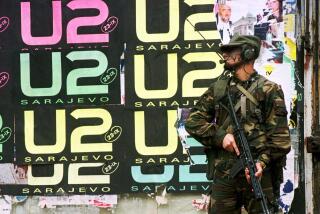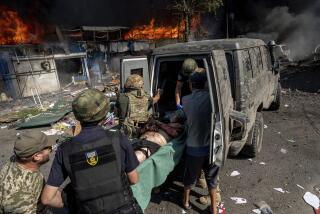Commentary / PERSPECTIVE ON INTERVENTION :...
- Share via
The terrible human tragedy in Bosnia presents the international community with a double political and moral challenge. First, there is the case of Bosnia itself: What does it mean and what should be done? Second, Bosnia may well represent part of our future--a terrifying preview of other situations that could assume its proportions. Indeed, Somalia--while different in character than Bosnia--illustrates how different continents can produce similarly devastating results.
Bosnia has provided the world with the second Sarajevo catastrophe of the century. Between Sarajevo of 1914 and Sarajevo of 1992 was the Cold War. The combustible forces that have produced Sarajevo II pre-existed the Cold War, but they were repressed and contained by the tight logic of the superpower competition. The combination of ethnic rivalry, religious conflict and nationalist aspirations, however, were suppressed, not dissolved, by the Cold War. Existing at a subterranean level, they erupted at the first opportunity.
The moral issues of the Cold War were cosmic in scope and often technological in character. The moral issues of Bosnia are rooted in intractable particular memories, historical grudges, and are fought out over square miles of contested territory. The shift in the nature of the political-moral challenge accounts in part for the confusion and paralysis of the European Community and American policy and public opinion. Some have characterized the U.S. and European response as simply moral neglect; my sense is Bosnia has not been ignored in the media or the public mind, but there is honest disagreement about how to translate a sense of moral responsibility into an effective policy.
To use the traditional moral calculus for intervention, Serbian policies in Bosnia have clearly given the world “just cause” to intervene militarily. But there are serious objections about the possibility of succeeding in an intervention or simply adding more firepower from the outside to a murderous conflict.
As we struggle with what to do about Bosnia, part of our personal and policy reflection ought to include the fact that other ethnic, religious, nationalist conflicts are waiting to explode. The Cold War was centrally related to Europe but its disciplining effort extended to other areas of the globe. Now the restraints are gone. One effect of the end of the superpower conflict has been the spread of democracy. An equally pervasive effect has been the unleashing of conflicts locked in cold storage for decades.
What we do or fail to do in the Bosnia case will set precedents for the future. Thus far the signals sent on Bosnia have been the wrong ones; the Serbs may be on the verge of completing “ethnic cleansing” without effective opposition from any quarter of the international community. There have been meetings, sanctions, warnings and castigations but not an effective policy.
The international community has long held sacred the sovereignty of states and the norm of nonintervention. Today, state sovereignty is eroded from above by transnational forces and from below by Bosnian-type conflicts. Today, both the meaning of sovereignty and the norms of nonintervention need to be reviewed and revised.
In the face of either Bosnia or Somalia, there are reasons for intervention. The precedents should be set in favor of multilateral action to forestall outside powers using conflicts for their own purposes.
Other forms of intervention should be tried before force is contemplated, but military means should not be ruled out. The most difficult question, whether military force can be effective and contained, makes me skeptical about using it in Bosnia, but convinced that Somalia could meet both tests. That question should be pressed vigorously each time military means are contemplated.
Bosnia is a window on the post-Cold War world. Its lessons thus far are that we have more hard questions than good answers.
More to Read
Sign up for Essential California
The most important California stories and recommendations in your inbox every morning.
You may occasionally receive promotional content from the Los Angeles Times.













